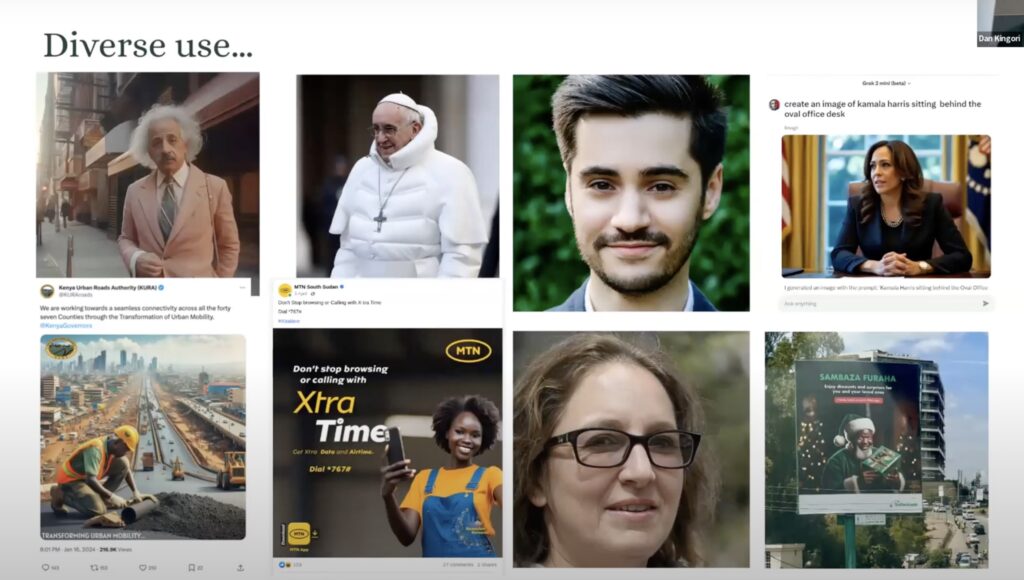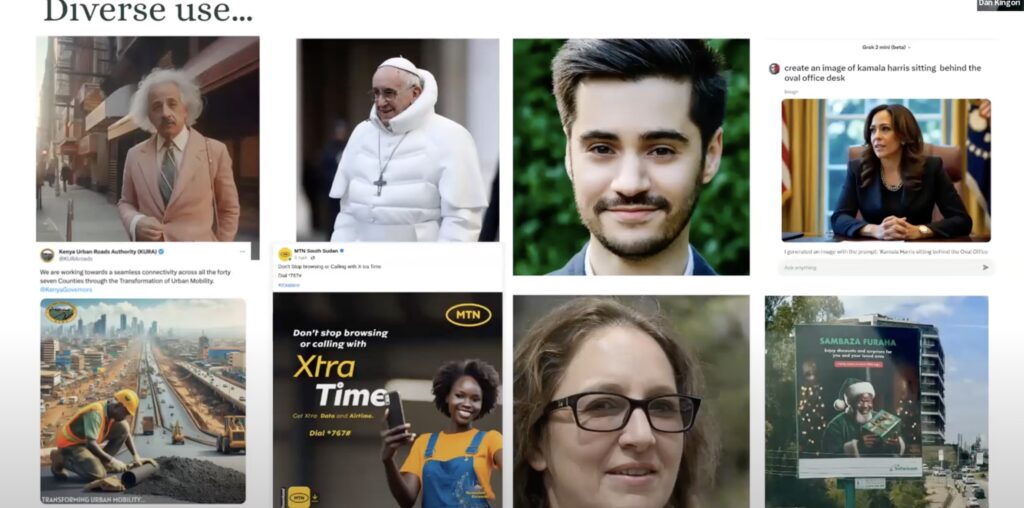Community Call – AI Series
In August, GIG hosted the first community call in the new AI series which aims to have a conversation about if and how Makerspaces are using AI and what the feelings are around this new technology which has taken the world by storm. This first community call of the series was on the topic of AI-generated images. GIG’s own Geraldine De Bastion hosted and moderated the rich conversation where we were lucky to be joined by Dan King’ori from the r0g agency, who has a plethora of experience tackling fake news, misinformation, and online hate speech.
In recent years the use of generative AI for image creation has exploded. What started off as something that was rather basic with major identifiable errors has now developed into something that is much more complex and difficult to detect as AI. Additionally, the use of generative AI images has expanded into many sectors and areas. Some are light-hearted and comical but others can incite hatred and misinformation. For these reasons, it is extremely important to discuss how we as a community can be better educated on this type of technology and its uses.

Dan King’ori first explained that an AI-generated image is an image that is created based on text prompts and an AI-trained dataset. AI-generated images are becoming more prevalent in society, appearing on social media and now in advertising. Dan King’ori presented practical tips to be able to detect such AI-generated images and to prevent the potential of fake news and misinformation.
Manual identification is one manner to detect AI-generated images. This includes glitch analysis and metadata analysis. Glitch analysis is assessing the image for watermarks, hyperrealism, inconsistencies, blurring, and proportion errors. Metadata analysis is looking at the data connected to the image to see if this can present clues to the nature of the image.
There are also innovative approaches to AI-generated image detection such as AI-powered detection and addressing provenance. Reverse image searches are one useful method that can highlight if the image has appeared anywhere else but it can highlight what others on the internet are saying about the image which may reveal some very useful information.
However, Dan King’ori also noted the essential element of increasing community resilience to misinformation. Digital literacy and media literacy should be a priority and individuals’ need to approach online content with a critical mindset. Additionally, the community needs to come together and be more vocal about this, share information, and support each other to prevent individuals from becoming vulnerable to the negative repercussions of AI-generated images.
This is nuanced by the fact that there are some fantastic outcomes from the use of AI-generated images for example in education and story-telling but a common concern from the attendees was that AI should serve and support humanity, not the opposite. Content and image creation is also a creative pursuit and we need to consider how far we want AI to bleed into these areas of craft, art, self-expression, and innovation so it adds to the process rather than replacing it. Potentially we need to adjust how we think about Generative AI so we see it as a supporting tool rather than simply a provider of outputs and solutions.
AI, its functioning, and its uses are very complex and ever-changing, therefore, people need to be equipped with the skills to be skeptical of content online so they can form their own opinions and prevent dominant narratives from being the only narrative. Guardrails such as policies, regulations, checks, and standards can be implemented to ensure an environment of trust and safety around Generative AI and online content.
This fascinating discussion on AI-generated images is just the first of many interesting conversations on the topic of AI. GIG thanks Dan King’ori and all the attendees for their participation in the thought-provoking conversation.
Watch the whole discussion:
Presenter
Dan King’ori is a technology consultant and web developer for the r0g_agency’s #defyhatenow global project. He has been involved in projects utilising technology for peace solutions, conflict mapping and combating online hate speech.


